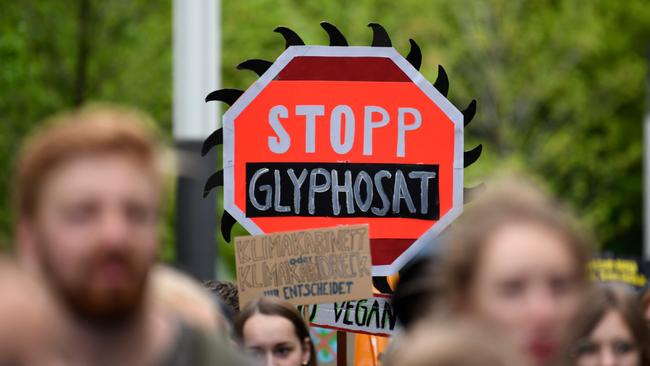Mont Albert mum calls for councils to stop using toxic weed killers
Some councils have banned it, and the World Health Organisation says it likely causes cancer. Now a mum whose son fell ill after playing in a Mont Albert park is among those asking why a common weed killer is still sprayed widely in Melbourne’s public spaces.
Inner East
Don't miss out on the headlines from Inner East. Followed categories will be added to My News.
A Mont Albert mum fears her son may have been poisoned by a toxic weed killer commonly used by Melbourne councils.
Marissa, who didn’t want her surname published, said tests to uncover the cause of her five-year-old son’s rash and digestive problems had revealed “shockingly high” levels of glyphosate, the active ingredient in Roundup.
His test results show a reading of 4.25 — almost twice a “high” reading of 2.5.
The report accompanying the results said glyphosate — which only remains in the body for a few days — was linked to many chronic health problems, including a number of cancers and intestinal problems. It enters the body by absorption through the skin, eating food treated with glyphosate, or drinking water contaminated with the chemical.
“His levels were shockingly high. Our doctor said … his level was the highest she had seen,” she said.
“I knew that I didn’t spray our garden, and we eat mainly organic food.
“It was only a few days after we got this test back that I saw them (council staff) spraying a small park on our street that we often had picnics in.”
MORE LEADER NEWS
WHAT’S WITH THE STINK AT SOUTHLAND?
THE TYPES OF FISH YOU SHOULD BE EATING
WHAT YOU GET AS A LEADER COMMUNITY NEWS SUBSCRIBER
Marissa, who lives in the City of Whitehorse, said her family had stopped visiting the park and she called on councils to scrap use of potentially toxic sprays in public spaces.
“We shouldn’t have to choose between avoiding glyphosate exposure and enjoying our parks and gardens,” she said.
Meanwhile, Ashburton mum Moira Tobin photographed a Boroondara Council contractor spraying weeds right next to a woman outside Fordham’s Milk Bar cafe in Camberwell on August 16.
“What they’re doing is wrong,” she said. “I’d like glyphosate removed full stop and weed steaming (with hot water) taken up as an everyday practice.”
Boroondara Council spokeswoman Carolyn Terry confirmed the council used glyphosate weed killers but she said alternatives were being investigated.
She said The Australian Pesticides and Veterinary Medicines Authority deemed glyphosate weed killers safe when used according to safety instructions.
Contractors were under strict instructions not to spray near cafes, barbecues, playgrounds and plants grown for consumption, and the contractor photographed on August 16had been reprimanded.
“The council is aware of recent studies indicating possible health risks associated with glyphosate use where such instructions are not followed,” she said.
“The council is working with WorkSafe and our risk management team to determine any changes to current work practices that may be required.”
A Boroondara Council report on alternatives to glyphosate weed spray is due later this year.
Glyphosate was classified last year by the World Health Organisation’s International Agency for Research on Cancer as “probably carcinogenic to humans”.
Whitehorse Council spokesman Nigel Brown said the council used glyphosate based weed-killers in accordance with relevant legislation and best practice guidelines.

Cancer related compensation claims have also successfully been made against weed killer manufacturers in the United States, with the latest case seeing a Californian jury ordering Monsanto to pay $US2 billion to a couple who said Roundup caused them to develop non-Hodgkin’s lymphoma. This was later reduced to $86.7 million on appeal.
Several countries have already banned glyphosate, including the Netherlands, Columbia, Sri Lanka, and El Salvador.
MORE NEWS: US JURY ORDERS MONSANTO TO PAY $2B
COUNCIL TO TRIAL ALTERNATIVE TO ROUNDUP
Some Australian councils have already abandoned use of glyphosate weed killers amid health fears, including Maribyrnong Council which announced this month (August) it would use steam to kill weeds. Surf Coast Shire Council has almost phased out glyphosates and the Borough of Queenscliffe does not use them.
Others, including Kingston, Casey, Mornington and Moreland, have reviewed their use of glyphosate weed killers in recent years, instructing staff to adhere to strict safety procedures when using the sprays.
A WorkSafe spokesman said employers must ensure staff who handled chemicals had access to safety data sheets and controlled any risks associated with the product.
A Department of Environment, Land, Water and Planning spokesman confirmed the Australian Pesticides and Veterinary Medicines Authority had advised glyphosate was safe when used according to safety instructions.


